New Chapter for Erika Reineke
Published on June 14th, 2017
Erika Reineke closed out her college sailing career by winning her division at Women’s Nationals and being named Women’s College Sailor of the Year. Not bad for someone who was only known as a Laser Radial sailor when she entered college.
Scuttlebutt editor Craig Leweck checks in with Erika, where they discuss her background, her college years, and her goals for gold at the Tokyo 2020 Olympics.
What was it that got you seriously connected to sailing?
It’s probably just the competitive aspect of it, which is not unlike a lot of sports, but what’s different about sailing is that you can do it forever. And as you move up through the various levels, your friends tend to move up with you. I think that’s really cool to see people grow along the way, and that friendships I had when I was eight years old are still existing when now I’m 23. I think that’s what really stuck with me is having competitors that are also your best friends.
You grew up at Lauderdale Yacht Club which has got an impressive track record for stud youth sailors. Were there any instructors that were key to your development?
I think the first instructor that I ever connected with was Ben Williams. He was my Opti Coach and now he’s the triathlete and lives in Hawaii and is just killing it. But he just believed in me and I’ve never had a coach like that. He just thought I could do it, and I think that’s what really got me to stay in the sport and wanted to keep going.
Then there was Brad Funk who has influenced me throughout my Laser career in high school, and then when I got to Boston College there was head coach Greg Wilkinson. All these people saw something in me, believed in me, and helped me maximize my potential. I’m really grateful for that.
Anything about the Lauderdale Yacht Club area that was beneficial?
Aside from the epic weather, I would say the venue is absolutely unbelievable. To be able to sail out in the ocean is just something kids enjoy. But I’d also say that Lauderdale Yacht Club is really good at having a balance between fun and also working really hard and being serious. That balance has been a key to Club’s success at developing great young sailors over the years.
You went from Optimist to Lasers, but was there much doublehanded sailing before college?
Not much. I went from the Opti and crewed on a 420 for two months before switching to the Laser, so not much at all.
Why the emphasis for Lasers?
There is just something about the boat that I fell in love with, but also Anna Tunnicliffe at the time was training at our yacht club, and having her there, and hearing her inspiring stories, and talking about her passion for the boat, really influenced me to dive into it, so she was a huge influence on me to commit to the Laser.
Going into college, you’re an internationally acclaimed Laser sailor, and you leveraged that by being a 4-time College Singlehanded National Champion. But so much of college sailing is in doublehanded boats. How did Laser sailing help you make that transition?
You have have to be extremely fit for Laser sailing, which is also hugely important for doublehanding. So I was already at a high level in that area, but also there’s something about the feel of the Laser in the helm that I think a lot of doublehanded sailors don’t gain before college. Speed is critical in college sailing so by having that background in the Laser, and knowing exactly what the boat is supposed to feel like when it’s going fast definitely proved to be an advantage.
Switching between Lasers and doublehanded boats in college must still be awkward.
It’s definitely awkward to hop back in a boat when you haven’t been sailing it for a bit, but for the most part, sailing is sailing. The tactics are generally the same, so all that repetition in college, six days a week that we had practice, even though I’m not sailing the Laser, it transfers right over to the Laser racing, to the Olympic-style racing.
I think another cool thing about the doublehanded stuff is you have somebody else in your boat, and I think that’s opened my mind a bit more. Not long ago in a Laser event, I was thinking about things my crew said that I would have never thought of on my own. Just positive things – crews really help with managing my mentality. They’re almost like sport psychologists, to be honest. Having to deal with a crazy skipper [laughter]. It opened up my mind to hear what other people have to say.
On the topic of managing your mental state, is that one of the big lessons of college sailing is in how you need to keep it together through so many races?
Oh, yeah. Totally. In college sailing, you can have 18 races on a weekend, so every race you’re fighting for it. And if you get a bad result, you’ve got to move on because there’s going to be 17 more. So it hugely important to stay strong mentally, and treat the next race as the first race. College sailing has been super helpful with that. As always, keep fighting no matter what.
During your time at Boston College, you were juggling both your involvement on the school sailing team and your intention to compete at the Olympic Games. How have you managed that?
I would say, overall, it’s a bit difficult. You have the pressures that, to win a gold medal, people are always saying you have to go full-time, which I do also strongly believe in. However, I do think that the repetition of races in college sailing, can help. But juggling it, going back and forth, has been really difficult, but I think keeping your foot in both boats is helpful later on.
So I’m not really entirely sure how to answer that question just because I’ve struggled with it. For sure, the US Sailing Team has wanted me to focus solely on my singlehanded sailing, but overall, I don’t think that would’ve been the right decision. Now as I am looking toward the 2020 Olympics, I’m glad I have the full background in college sailing and I’m glad I still had a foot in the Laser as well.
Part of your juggling was taking a year off from college, correct?
Correct. I graduated with a Environmental Geoscience degree in five years instead of four. My coaches and I saw the possibility that I might be able to qualify for the 2016 Olympics, so we decided to take off a year. And even though I did not qualify for the Olympic Games, it was a major step forward in my Laser career, so I don’t regret that year at all as I improved a lot.
I still haven’t done a full Olympic campaign in a Laser, and now that I’m done with college, I’ll be able to go full-on toward qualifying for the 2020 Olympics. And having that year off, and seeing what the pressure of the trials is like, will be a huge asset to me going forward.
Getting back to college, you also skippered in A Division at the Coed Nationals, finishing third but just five points out of first. How would you compare the Women’s Nationals and the Coed Nationals?
If you would’ve asked me that when I was a freshman, I would’ve said yes, there’s a difference. I think back five years ago and there were just a few stand-outs in the women’s. However, now after just both events, they are both at an extremely high-level.
To be honest, I don’t see a difference at all. That says something about how women’s sailing has evolved. It has progressed so far during this period, and how there are so many women now that are capable of sailing coed. I’d say the top dozen girls who skippered at Women’s Nationals could sail at the coed level. So I don’t see a difference at all. I can honestly say that.
And somehow the Boston College program turned you into a doublehanded stud.
I’ve probably said this 1,000 times, but I just cannot get it out of my mind. I came into BC as basically a solo Radio sailor. That’s it. No team aspect behind it. All I knew was to sail by myself, in a boat, alone. And at BC, I found that there was a team aspect, and how everyone on the team was pushing each other to be better, whether you were a starter or not.
We had so many unsung heroes that were never going to sail in an inter-sectional event, but were pushing other people who were going to sail those events to be better. I witnessed a level of selflessness I’ve never seen before, and that’s why college sailing is such a unique area of the sport.
This whole team aspect was the coolest thing I’ve ever seen, and it is hugely present at BC. There’s some teams that aren’t that close, and kind of only work together on the water, but on our team I felt like everyone who was like a family member. It was quite cool and I am going to miss that.
What does being named Women’s College Sailor of the Year mean for you?
It’s an incredible honor, and I’m very proud of it. But once again, it would mean nothing without my team. I would not have been able to achieve that without them helping me and pushing me, keeping me sane in the boat. We all know those college sailing conditions can be completely random sometimes. So while the award was given to me, it is honestly a team award, and that’s why I’m most proud of it.
So on to the next chapter. You’re home, you’re fully focused on Tokyo 2020, and you’re going to embrace your first full Olympic campaign. How’s that?
It’s nerve-wracking and also very exciting. I couldn’t be more excited to start. This is what I’ve always wanted to do, and I want to represent our country and bring home gold from Tokyo. So I’m going to just do everything I can to achieve that. It’s weird because out of college, so many people I know had a job and were beginning their professional career. And that’s how I look at this campaign. This is my job and the Olympic Games is my goal. So I’m excited to start going for it.
Follow Erika at erikareineke.com


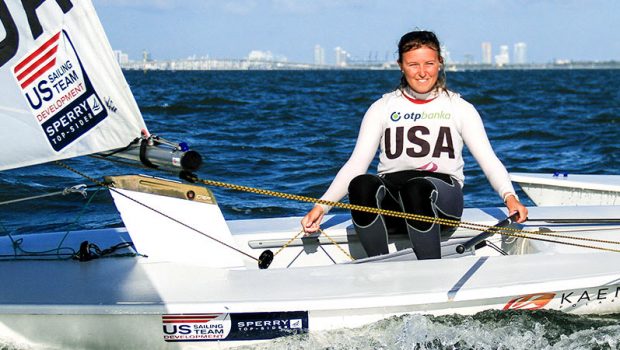

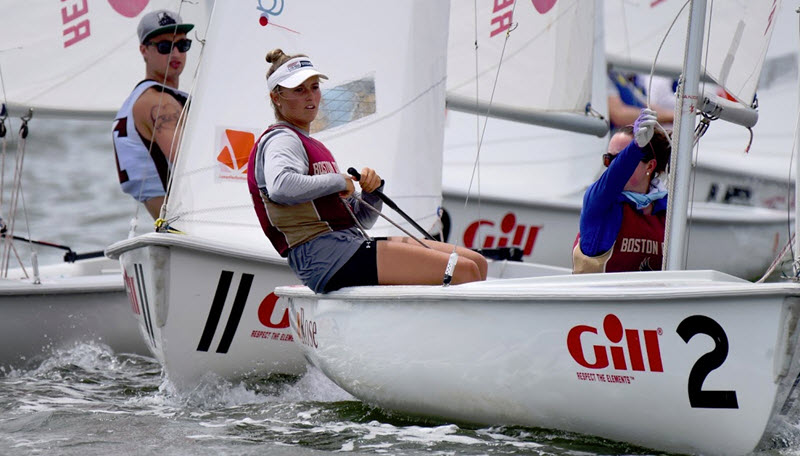
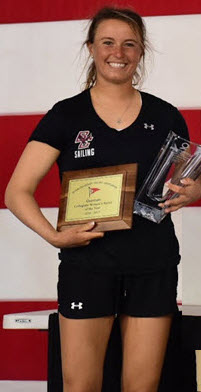

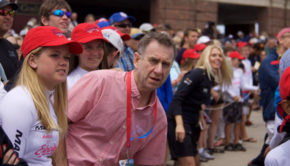

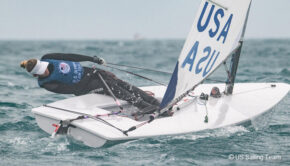
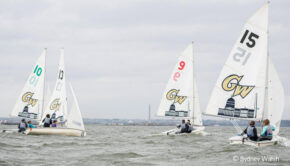
 We’ll keep your information safe.
We’ll keep your information safe.